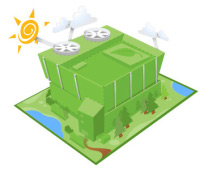 Cloud computing does not always prove to be an ecological choice. New research compiled by the WSP Environment & Energy and the Natural Resource Defense Council shows that cloud is not always as efficient for IT solutions for SMEs.
Cloud computing does not always prove to be an ecological choice. New research compiled by the WSP Environment & Energy and the Natural Resource Defense Council shows that cloud is not always as efficient for IT solutions for SMEs.
The results of the new study confirmed that rely on a server is generally more environmentally friendly, although care must be taken to a whole series of parameters to calculate the best real efficiency of the clouds.
“There are many reasons for moving to cloud computing, but a company choosing to do so for pure energy-efficiency reasons need to look closely at their whole IT set up as well as those of third-party offerings,” WSP director David Symons said. “Not all clouds are created equal. An on-site server room that is run with energy-efficiency best practices may be a greener alternative to a ‘brown cloud’.”
According to a new research from Pike Research, the global market for green data centers will grow from $17.1 billion in 2012 to $45.4 billion by 2016.
To be more specific to understand the real impact of the server, it is important to assess the energy source that produces electricity consumed by the storage systems, the energy efficiency of data centers and the type of equipment and devices that are used. It is also important to keep in mind that a data center has a more environmental impact than a system.
The research based on five setups scenarios, on-premise with no virtualization; colocation with no virtualization; on-premise with virtualization; private cloud; and public cloud, found that on-site server with no virtualization will emit about 46kg of CO2 per year. The figure will touch 2kg if a person using a public cloud conforming to best practices.
If you are storing data on the public cloud but using a public cloud provider whose servers are not that efficient, are not well used and use electricity from higher-carbon-emitting sources, there could be scenarios where running your own servers is a greener option.
Overall, the study revealed that running business applications in the cloud is considered as more energy and carbon efficient than running it on-premise. While cloud computing is generally more energy and carbon efficient than on-premise server rooms, SMOs looking to improve the environmental sustainability of their operations should ask cloud service providers for full disclosure of the carbon efficiency of the services they offer.